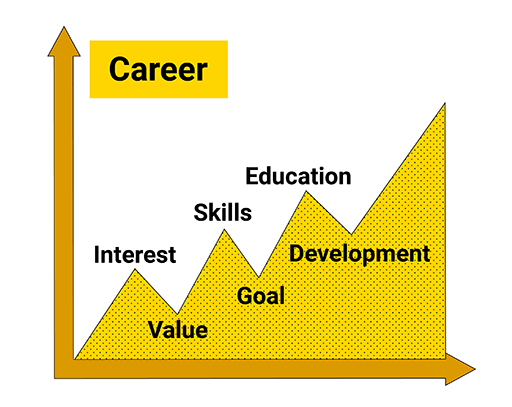3 Developing your work
Managing your job is an ongoing process, as is being active in your work planning whatever stage you’re at and keeping your skills up to date through learning.
Make the most of existing opportunities that may be available, especially if you work for a large employer, such as internal training, career development programmes or secondments with a partner organisation. Reviews will open up the opportunity to discuss these and other ideas such as mentoring or trialling a new role, irrespective of the size of your organisation. Take a look at the section ‘Conversations about your career options [Tip: hold Ctrl and click a link to open it in a new tab. (Hide tip)] ’ if you have a review coming up or are preparing for one.
It’s sensible to have plan for the next five to ten years of your work:
- You can do this by thinking about what you want to achieve in the long term and identify short term objectives to help you get there.
- Use a personal development plan (PDP) to track and manage your professional development. Make sure your plan is SMART: specific, measurable, achievable, realistic and time bound. Check your plan from time to time, revising your targets if necessary. This can also provide valuable information for your annual review and for updating your CV
- Be aware of factors that could affect your sector, through specialist magazines or professional organisations linked to your industry. Using labour market information (LMI) is a good way of finding out about new trends, opportunities and skills gaps.
Getting ahead in your current job
- Take on new challenges, either at work or in your leisure time. For example you could become involved in a project such as building a website, running a campaign or organising an event in a different area to develop skills and take on responsibility.
- If you’re looking for a change in your work, first see if there are opportunities available with your current employer. They won’t want to lose a valued member of staff so find out whether there are any options that might suit you. If you want to look outside of your current employer, develop your network of contacts. You can do this at work, outside work and online. Professional networking sites like LinkedIn allow you to connect with people in your sector, in your organisation, nationally and internationally. If you haven’t used LinkedIn before, you can start with this step by step guide to making the most of LinkedIn.
- Continue to learn, either formally or informally. Developing your skills, knowledge and abilities can be life-changing, whatever stage of your work. Continuing professional development (CPD) is the learning and development you undertake that contributes to being effective in your profession. So long as they add value to your work, a range of activities can contribute to your CPD. You can choose from a number of online free courses to get started.
Activity 2: The CV challenge
Scenario for the challenge – Your CV, a record of your work experience, your qualifications/training and skills you’ve developed, hasn’t been updated for the past 5 years. You now see an opportunity that is a good fit with your work goals, your interests and your future way of working.
Your challenge is to map out how you would go about updating your CV. Allow yourself 20 minutes to list actions you will take forward. (Please note: You are not expected to create a CV in this time, but review your CV and identify steps to take forward.)
Some general suggestions to get you started:
- Identify the sections of your CV that need updating – your profile (if you have one), employment, responsibilities/positions (inside or outside work e.g. being a committee member of a community organisation), etc.
- Collect the information you need. For example you could look up the dates and titles of the training you recently undertook, note the significant tasks you completed either through employment or voluntary work, or check the dates and details of educational courses.
- Go through your review documents to identify achievements or notes from your 1-2-1s with your line manager.
- Identify articles/courses/templates that will take you through completing the sections of a CV or a workshop you could attend.
Discussion
By breaking it down into bite sized actions the task of updating or creating your CV will seem more manageable. Attending an online or face-to-face workshop is a good starting point, alternatively going through CV guidance documents or online instructions will help (see link below). You may want to add sections to your CV that you didn’t have before, take a look at some templates to get some ideas. Consider who you will use as referees (though you don’t need to add names of your referees to your CV). Remember that it’s really important that the CV is relevant to the position – put yourself in the recruiter’s shoes and ask ‘would I call this person for an interview?’ The test of a CV is getting you to interview, so always keep it relevant, concise and easy to read.
For extra advice and guidance on developing your work and constructing your CV, take a look at the Additional resources section.

